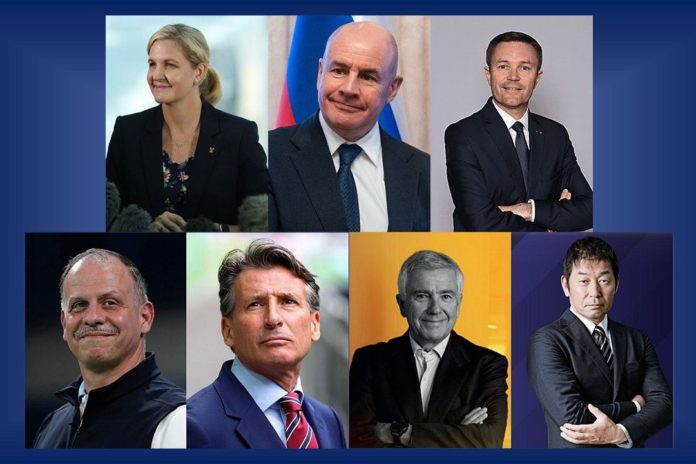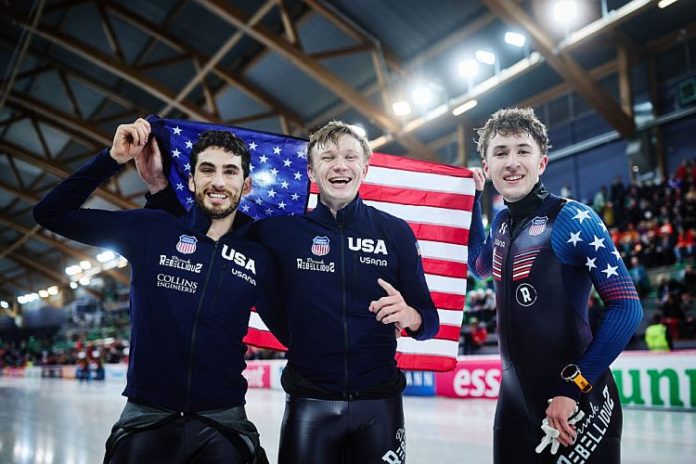★ The Sports Examiner: Chronicling the key competitive, economic and political forces shaping elite sport and the Olympic Movement.★
★ To get the daily Sports Examiner Recap by e-mail: sign up here! ★
≡ IOC PRESIDENTIAL ELECTION ≡
The waiting will finally be over about 5 p.m. next Thursday in Costa Navarino, Greece, when the International Olympic Committee elects its 10th President during the 144th IOC Session.
The seven candidates, from six countries, have been waging a sedate campaign for about six months since the 15 September 2024 submission deadline. The line-up, in alphabetical order, with current ages:
● Prince Feisal Al-Hussein (JOR: 61)
● Sebastian Coe (GBR: 68)
● Kirsty Coventry (ZIM: 41)
● Johan Eliasch (GBR: 63)
● David Lappartient (FRA: 51)
● Juan Antonio Samaranch (ESP: 65)
● Morinari Watanabe (JPN: 66)
In Costa Navarino, there will be a straight election, without any further campaigning. The winner will be in control of the most important body in international sports, controlling a financial juggernaut that hosts just two first-line events every four years, yet generated $7.7 billion in revenue for itself from 2021-24 and has already contracted for about $17 billion U.S. in revenue from 2025-2036.
So, with days to go, where do we stand?
Anyone who says they know who will win … does not know. The situation is too fluid. Part of the instability is in the election rules. The format:
● If all 109 IOC members show up – and everyone will try, even those in difficult health – the first round of voting will include a maximum of 92, removing the candidates (7), Bach (1) and other members from countries with candidates: France (3), Great Britain (2), Japan (2), and Spain (2).
That means a maximum of 47 votes will be needed to win on the first round, but with more and more in succeeding rounds as candidates are eliminated (and their countrymen/countrywomen are added back).
● The elimination protocol:
“If no candidate obtains the absolute majority of votes in a round of voting, there will be other rounds of voting until a candidate obtains the absolute majority of the votes. The candidate obtaining the fewest votes in each of the rounds of voting will be eliminated and will not participate in the following round of voting.”
IOC President Thomas Bach (GER), under the regulations, will not vote in any round except if there is a second tie between two final candidates, then he can vote “after consultation with the IOC Executive Board.”
If you are wondering about the demographics, they break down this way:
By continent:
● 45: Europe (33 can vote in the first round)
● 20: Asia (16 in first round)
● 19: Americas
● 18: Africa (17 in first round)
● 7: Oceania
By gender:
● 61: Men (47 can vote in the first round)
● 48: Women (45 can vote in the first round)
So, there is no obvious group that instantly delivers the needed 47 votes on the first round, either by region or gender.
If the recent decades of voting by IOC members are any guide, a promise by a member to vote for someone is often for the first round only. After that, they are on their own.
Some 76 of the current 109 IOC members have been elected during Bach’s presidency, but he hardly has control of them all, especially those who have chafed under his firm control of the organization.
Four of the seven candidates are from International Federations: Coe (athletics), Lappartient (cycling), Watanabe (gymnastics) and Eliasch (ski & snowboard). Of the nine IOC Presidents so far, only one came from an IF: Swede Sigfrid Edstrom, a member of the Stockholm 1912 organizing committee and one of the founders of the IAAF as the governing body of athletics. He became IOC President in 1942 upon the death of Count Henri de Baillet-Latour (BEL), and was elected in his own right in 1946. He served until 1952, when he retired at age 82.
All eight others have come from elsewhere, mostly associated with National Olympic Committees.
¶
So, where do we stand?
The only agreement that most election observers have come to is that Japan’s Watanabe is the most likely to be eliminated first, as his radical idea of a five-continent, 50-sport Olympic Games is simply too wild.
Eliasch is the most likely to be eliminated next, although his brilliant career in business as the billionaire chief executive of the Head sporting goods firm has earned him enormous respect. But he joined the IOC only in 2024 and the membership has had little experience with him.
Then it gets tight. Lappartient is the only Francophone candidate in the race and has been all over the Olympic Movement across the last four years, as the head of the Union Cycliste Internationale, as the President of the French National Olympic Committee (CNOSF) and the head of his French department in Brittany! He has been the IOC’s liaison to the e-sports community and has done a strong job in moving an “Olympic Esports Games” forward, to be held in 2027. But, as a sure signal of his success, he has some strident detractors.
Jordan’s Prince Feisal sees himself as a possible upset winner, saying in a 6 March AIPS forum:
“I’ve got a good chance. I really feel that the momentum is growing, it’s building up. A lot more people are coming up and talking to me. I believe, based on the numbers that we’re hearing, I’ll be in the last four. I think I can get to the last three, and depending on who I am up against, there is a real chance, I think, for me to win.
“And I’m in it to win it. I’m not in it just for the sake of appearing and I think I can contribute to making the IOC a better place.”
If you take the time to hear him, Feisal is impressive. He has educational roots in the West, graduating from Brown University and then the London Business School, and has been deeply involved in the Jordanian government, including his military service.
But the top three contenders have consistently been Coventry, the favorite of current IOC chief Bach, Coe and Samaranch.
Coventry, by far the youngest in the field at 41, is a seven-time Olympic medalist from Zimbabwe, who swam collegiately at Auburn, and is the Zimbabwe Minister for Youth, Sports Arts and Recreation. She performed splendidly as the head of the IOC Athletes Commission before voted into the IOC as an individual member. At home, she has been criticized for her ministerial work by activists who wanted to see more from her department.
As Bach’s preferred successor, her best shot to win will be on the first ballot. Even if every female IOC member voted for her in the first round, she would still be a couple of votes short of a majority. She has done plenty of interviews and campaigned quietly, but widely. Well known to the members, there’s no question about her devotion to athlete matters, and with Bach’s deal with Comcast-NBC for 2033-36, some of the questions she wants to ask about the future of media have been pushed off into the distant future. It may come down to whether the members feel she can with a world led by mega-personalities like Donald Trump, Vladimir Putin and Xi Jinping?
Coe, the two-time Olympic 1,500 m champion from Moscow and Los Angeles, has been a high-profile campaigner since the election filing. He has been everywhere, giving constant interviews and appearing all over the world, much of the time on World Athletics business, but also maintaining the highest-possible profile among IOC members. He’s the only candidate who has been on every side of the Olympic Games: athlete, bidder, organizer and as the head of both the British NOC and World Athletics.
The World Athletics move to award prize money in Paris – without telling anyone in advance – caught every other IF by surprise and has cast him – in some circles – as a polarizing candidate. Coe has said the communications should have been handled better, but that athletes need to find financial help anywhere they can. Further, he has eloquently pushed for the IOC to push harder on sport as a social development tool, and not so much on other programs involving the United Nations and cultural projects. That’s a powerful position that will have wide support.
If Coventry does not score a first-round knock-out, Coe will be well positioned to receive heavy consideration on a second ballot.
Samaranch has the advantage of being an IOC member much longer than any other candidate, elected in 2001. He has an impressive and highly-successful financial management background, was also educated in the U.S. (Masters at NYU).
He brushes off comparisons to his father, Juan Antonio Samaranch, the transformative IOC President from 1980-2001, saying the situations he faced are completely different and not relevant to today. The young (65) Samaranch has strong contacts with China and was the IOC Coordination Commission chair for the difficult 2022 Beijing Winter Games.
If the membership cannot come to an early decision between Coventry and Coe, Samaranch is an excellent alternative who will be seen as someone who will try and achieve true consensus, and be highly attentive to the interests of the members as ambassadors of the Olympic Movement in their countries.
This appears to be a close call, with no way to know now what will happen.
And, no matter who is elected, they won’t be in charge for a while, as their term won’t start until 24 June. Bach will stay in command until then.
¶
★ Receive our exclusive, weekday TSX Recap by e-mail by clicking here.
★ Sign up a friend to receive the TSX Recap by clicking here.
★ Please consider a donation here to keep this site going.
For our updated, 895-event International Sports Calendar for 2025 and beyond, by date and by sport, click here!


























